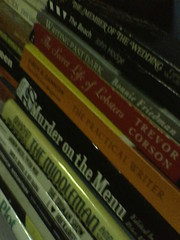Here's an old Salon article where Alan Ball talks about how he came up with the plastic bag scene. He encountered the wayward plastic bag in New York in the early '90s, when he was a television writer by day and writing plays for a doomed theater company at night. It sounded like a midlife crisis, when you think about it. That plastic bag circling around him felt like a moment of grace, and it came at a time when he was feeling lost and needed direction. Just like Lester in the movie, Ball felt like he had written himself into a corner, and all he felt was "anger at having to write television characters over and over who did nothing more than 'trade insults.'"
The moment with the plastic bag stewed in his mind for years, and it was only in the late '90s that he came to write "American Beauty," which the article describes as something of a "minor miracle." Ball sold the script eight days after putting it up for sale, the director Sam Mendes allowed him to be on the set during filming, and eighteen months later, it was in the theaters.
So I suppose one could say that plastic bag sort of saved Alan Ball's drowning soul in that moment. Of course, after getting accolades for "American Beauty," he continued to write for television, i.e., "Six Feet Under" and "True Blood." But perhaps winning that Oscar allowed him to call shots after that.

